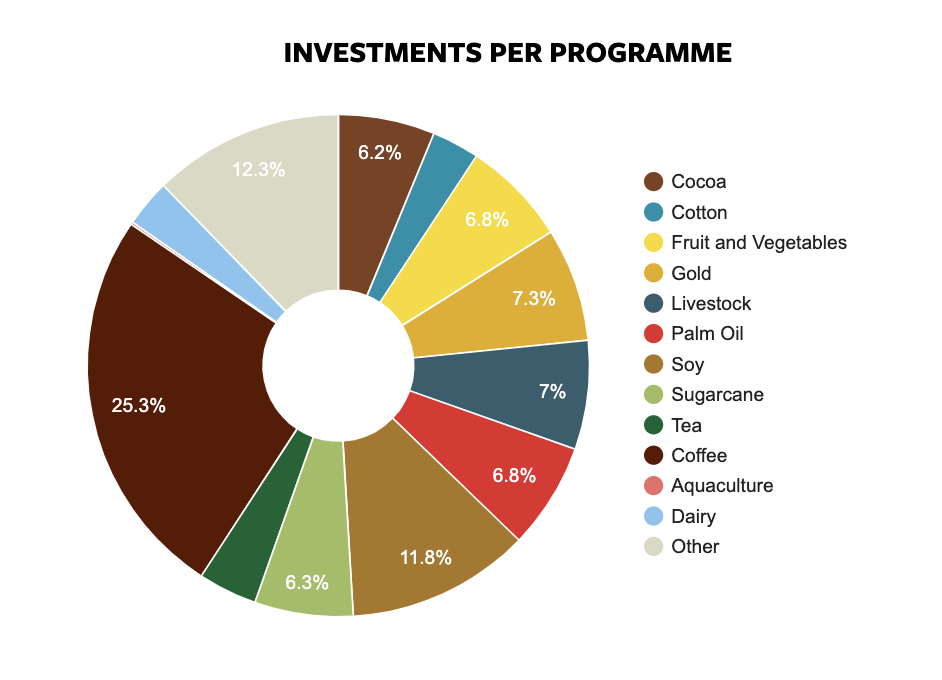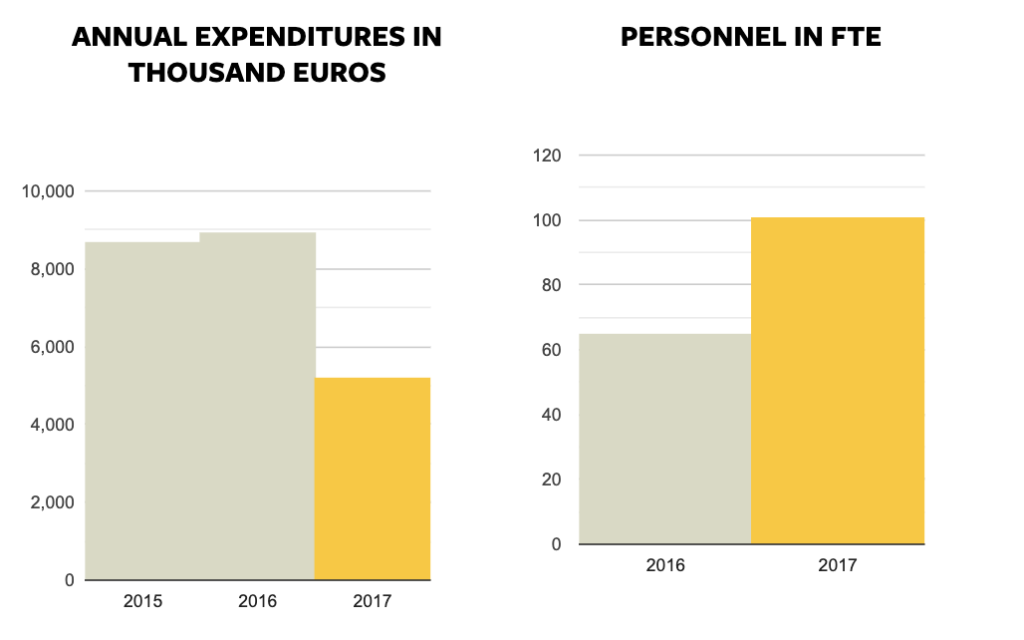COFFEE
Solidaridad’s intervention to incubate a deforestation-free business model for smallholder agriculture in the Brazilian Amazon has accelerated during its third year. Solidaridad completed tests on a carbon balance tool adapted to the Amazon farmer profile. This will provide data on specific emission factors to guide public policies and investments on low-carbon systems. Meanwhile, Solidaridad began the search for market partners at Tropical Forest Alliance 2020, the Chocoa Festival and the Alliance for Amazon Restoration.

Solidaridad has demonstrated a proven concept for its climate-smart coffee model. It is now disseminating this and developing scalable models for traders and investors. This is to support access to credit for producers. Solidaridad is known for its platform model for coffee in the region, and, as a result, the organization is often invited to advise on the establishment of the Peruvian and Honduras platforms. Solidaridad manages the local implementation of the Global Coffee Platform in Colombia.

The six-year project with the C&A Foundation to develop a profitable model for small cotton growing in the Brazilian semi-arid entered its second year. In order to cope with droughts, the project distributed 32 drip irrigation kits that almost tripled average productivity. Based on participatory planning with women, the project will also improve irrigation of backyard vegetable gardens to provide families with a surplus to sell in local markets.

In Peru, after three years of receiving technical support to improve the skills of organic banana family producers, productivity increased by 83%. This was despite severe weather and water shortages. In Brazil, the Solidaridad toolkit for continual improvement in citrus was benchmarked against the Sustainable Agriculture Initiative Platform. This will allow producers to assess their performance against several standards with just one questionnaire. It will also increase cost-efficiency in technical assistance from 2018 onwards.

For the first time in Bolivia, the Gold Symposium brought together mining sector associations and the government. Together, they set 27 sector priorities to redesign public policies to enable more responsible practices in the associative sector. In addition, Solidaridad presented the first gender analysis in the Bolivian mining sector. These results were based on a study completed in Peru in 2016. In Peru, Yanaquihua mining company renewed its Responsible Jewellery Council certification, first obtained in 2014.

Climate change continues to be the driving force for interventions in South America. Solidaridad is testing solutions to improve herds’ resilience to sustained droughts in Dry Chaco that can be incorporated in the design of public relief policies. In Brazil, Solidaridad tested pasture management carbon performance to develop a low carbon agriculture model in the Amazon. Building consumer markets in China, Japan and North America for low-carbon beef is a result of Solidaridad’s efforts on a territorial level.

Solidaridad is among the parties who signed the first deforestation-free agreement in Colombia. It also established a partnership with the largest private group in Peru for free-deforestation palm oil among smallholders. This partnership is aligned with new milestones set by members of the Sustainable Trade Platform for 2020. A new partnership with Wilmar International began to reduce deforestation, peat and labour exploitation among small producers.

The third stage of the Soy Fast Track Fund programme in Brazil and Paraguay highlighted the importance of integrated approaches on a landscape level to bridge the gap between public and private policies on sustainability and its implementation on a territorial level. Solidaridad is now facilitating a multi-stakeholder dialogue in Bolivia and northern Argentina to improve land use governance and is enhancing exchanges with China to spur sustainable trade.

The ELO project in Brazil ended its fourth year and resulted in 2,100 farms receiving support through digital solutions and the testing of a new mobile app for extensionists. In Colombia, a partner of the Sustainable Trade Platform, Procaña, adopted digital solutions which prompted an exchange visit from Brazil partners. In addition, Arcor in Argentina became the first company outside of Brazil to certify Bonsucro in the region.

A new partnership with beverage supplier S&D resumed the producer support model Solidaridad consolidated in Argentina in 2013. This model certifies tea production under the Rainforest Alliance Standard. Training of trainers and the digital platform to manage technical assistance are ready to commence. This will prepare producers to become professional suppliers, focus on farm profitability and legal compliance, as well as Atlantic Forest biome conservation

DEVELOPMENTS
Political instability in Brazil, Argentina and Peru has hindered and delayed some programmes. In Brazil, this instability has weakened legal instruments that previously enforced deforestation control and forest code compliance in the Amazon. In 2017, Solidaridad strengthened its ties with organizations working against deforestation and built knowledge on sustainable approaches and low-carbon agriculture.
In Peru, new changes to the political cabinet have meant restarting communications with the newly elected mining minister to positively influence the formalization process for miners. Meanwhile, the end of the term of the current government in Bolivia could potentially impact Solidaridad’s current initiatives in the mining and soy sectors. It is expected that the growth of the agro-industrial sector will imply further deforestation in the country’s eastern region. On a more positive outlook, the reconstruction process following heavy rainfall and flooding caused by El Niño has provided new opportunities for partnerships in Peru.
Colombia and Paraguay have benefited from political tailwinds. Colombia is experiencing a renewed interest in agriculture due to the peace process. This has opened new rural areas and, provided the issue of land entitlement is settled, will bring new funds for the inclusion of producers in supply chains and reduce the risk for investors. In Paraguay, the enactment of the Environmental Services Law is an important breakthrough in reducing pressure on native forests. This law creates an incentive to preserve coverage as it allows for the transfer of payments from farms with environmental liabilities to farm owners who maintain more than 25% of the native forest.

ACHIEVEMENTS
Demand for Solidaridad’s digital solutions has increased among the private sector. This consolidates Solidaridad’s role as a trusted partner in managing more cost-efficient and precise technical assistance. In 2017, the sugarcane programme with Raízen, “ELO”, assisted 2,100 farms with the development of a tested mobile application for extension officers.
A key focus has been the integration of climate-smart agricultural solutions into larger landscape governance interventions. In Chaco, a dry season occurred for seven months. Solidaridad established a governance body to facilitate access to loans for small producers to feed pasture-less herds. This was coupled with climate-resilient pilots to improve water availability, dairy productivity, and food security for indigenous communities.
The landscape approach tested with IDH to build deforestation-free soy supply catchments in risk-prone areas of the Amazon, Cerrado and Eastern Paraguay resulted in several local multi-stakeholder initiatives. In cooperation with Solidaridad China and Solidaridad North America, two exchange visits to both Brazil and Argentina was organized for major market players.
In Colombia, Solidaridad, its partners and the government signed a national commitment ensuring a deforestation-free palm oil supply chain by 2020. Members of the Sustainable Trade Platform established a new multi-annual commitment to bring sustainability to the next level. The National Authority for Forests and Land joined a public-private platform to assess opportunities to improve land-use governance and eradicate illegal deforestation in the soy sector. The Ministry of Mining & Metallurgy joined the first forum on responsible mining, an important step toward formalizing this process in the mining sector.

PARTNERSHIPS
The Ministry of Foreign Affairs of the Netherlands, the Good Energies Foundation and the C&A Institute are the main donors supporting Solidaridad’s new approaches in landscape governance and climate-smart models.
In 2017, the partnership with IDH to leverage responsible soy production came to an end and a new relationship with The Nature Environment, under the Collaboration for Forests and Agriculture Programme, began. This is mainly funded by the Moore Foundation to promote uptake of deforestation-free soy and beef.
New partners such as soy importer COFCO and beverage supplier S&D adopted our digital solutions to support continual improvement among soy and tea suppliers. Raízen, Socicana, Orplana, Citri and Firmenich took a step further by scaling up and testing new applications. Solidaridad performed a baseline study for Nestlé to identify opportunities for improvement in coffee in Brazil and Colombia. It also developed a business model for deforestation-free palm oil aimed at small producers in the Peruvian Amazon with Grupo Palmas.
Within multi-stakeholder initiatives in Colombia, Solidaridad consolidated its position as a facilitator in the Sustainable Trade Platform and actively participated in the Dialogue for Sustainable Beef and the Tropical Forest Alliance 2020. In Brazil, Solidaridad experts joined the Brazilian Coalition for Climate, Forests and Agriculture, the Alliance for the Restoration of the Amazon and Cocoa Action. They also joined forces with Imaflora, ICV and WWF to develop free-deforestation solutions. In Paraguay, Solidaridad became a member of the national chapter of the Global Roundtable on Sustainable Beef. In Peru, Solidaridad is developing a plan for sustainable development within the National Coffee Board.
ORGANIZATION
The year 2017 has been one of transition. While some of Solidaridad’s ongoing multi-annual projects are entering into their implementation phase, Solidaridad has reinforced its field teams in Brazil and Paraguay. In Paraguay, Solidaridad opened a local desk in Chaco, while the Brazilian team moved to a larger country office and opened two new local desks in Ribeirão Preto and Guanabi. This was undertaken to better support the Amazon and semi-arid landscapes, as well as the sugarcane production area.
In 2017, some long-standing projects came to a close. This led to learning processes and the addition of two experts to bring proven concepts to the next level. This will be done by developing business models and investable propositions. The conclusions from the soy landscape pilots with IDH will also be included in a publication and a learning event.
Solidaridad supported new knowledge and learning, including a groundbreaking study on the externalities of climate-smart agriculture, a climate-smart manual in Peru, and a study on gender inclusivity in the Colombian coffee supply chain. It organized a learning event on sustainable soy trade between South America and China in Argentina, and conducted a study on recommendations for deforestation-free agriculture and forestry investments in the Peruvian Amazon. In addition, Solidaridad released the National Manual on Occupational Health and Safety for the Ecuadorian Banana Sector.
